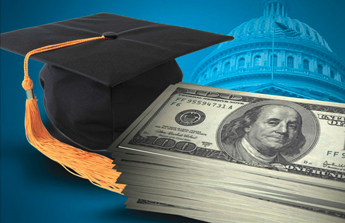Degrees not debt
By Nisa Islam Muhammad -Staff Writer- | Last updated: Jun 12, 2014 - 4:24:37 PMWhat's your opinion on this article?
New rule aimed at making for-profi t schools accountable

|
“Far too many students enroll in for-profit institutions because of high-pressure and deceptive sales tactics, rather than because the school gives them a genuine shot at a college education that can lead to lucrative job and employment prospects,” said Maura Dundon, senior policy counsel at Center for Responsible Lending.
“They leave riddled with debt – but without the necessary skills or education to find a way to repay their loans. And as low-income students and students of color are disproportionately represented in for-profit schools, they’re disproportionately affected,” she added.
According to Department of Education statistics, students at for-profit colleges represent about 13 percent of the total higher education population. However, close to 31 percent of all federal student loans—go to for-profit schools, popular with adult students and veterans attempting to develop a new or improved career. Nearly half of all college loan defaults are from students enrolled in such programs.
“Too many of these programs fail to provide students with the training they need — at the taxpayers’ expense and at the cost of these students’ futures,” Education Secretary Arne Duncan said in a call with reporters in March to preview the new rules.
“That’s why we are taking action to protect Americans from poor performing career programs that burden students with debt and leave them few opportunities to succeed,” he continued.
An extensive group of education, student, civil rights, consumer, veterans, and labor groups including the NAACP, National Association of Black Veterans and the Center for Responsible Lending submitted comments to the Department of Education calling for strong for-profit college regulations.
“The Department’s regulations must set forth serious consequences that will be imposed on for-profit programs that fail to meet a minimum threshold of performance. There are too many documented instances of these large, well-funded programs misleading students, the public, and regulators with regard to their success rates and their services,” wrote Bob Fellmeth, Executive Director Center for Public Interest Law, Children’s Advocacy Institute.
“If consumers are uninformed, the marketplace is not a sufficient incentive for change and improvement. Thus, if the Department does not implement strong, meaningful regulations and enforce them, for-profit programs have little incentive to provide the quality education so many students need and for which so many vulnerable individuals are paying enormous sums of money.”
In addition to the coalition, over 30,000 individuals also filed comments to call for a stronger gainful employment rule.
The Center for Responsible Lending has reviewed hundreds of emails from former for-profit college students. They tell stories of hardship, embarrassment, despair, and anger.
Borrowers feel a grievous sense of betrayal, not only towards the for-profit colleges, but also towards the government that failed to protect them from predatory programs.
Implicitly, student loan borrowers believe the government would not extend them a loan for higher education that did not provide even a slim promise of a return on their investment.
For-profit institutions and their representatives are crying foul.
“During the regulatory process we witnessed the Department (of Education) willfully mislead the public and policymakers by creating fake statistics, inaccurately representing the full impact of the regulation, and failing completely to address the loss of access to postsecondary education for 7.5 million students,” said Steve Gunderson, president and CEO of Association of Private Sector Colleges and Universities (APSCU).
“The Department, their allies, and proxies have misrepresented student outcomes, and the proposed regulation will harm both students who stand to benefit the most from postsecondary education with a career focus and employers seeking job-ready employees,” continued Mr. Gunderson.
The APSCU argues the regulation eliminates access for 7.5 million students over the next ten years, while doing nothing to protect students at public and private nonprofit institutions who have been identified by the Department’s own data as having unaffordable debt based on the gainful employment metrics.
The association contends the regulation is “flawed, arbitrary, and biased”. In a press statement they wrote, “The Department does not have the authority to regulate student outcomes in this manner. The Department fails to analyze adequately the regulation’s impact on underserved students and in-demand programs.”
“The regulation is backwards looking and does not evaluate all programs at all institutions. The regulation uses a one-size-fits-all approach, instead of taking into consideration the level of academic preparation and the socio-demographic characteristics of entering students.”
Proponents of the new rule seem to have the government’s backing.
“With 46% of all student loan defaults emanating from for-profit colleges, this federal program intended to help students is hurting them instead – wasting taxpayer dollars in the effort. The balance must be shifted back towards facilitating the promise of higher education, rather than exposing student borrowers to a failed market where they bear significant risk,” argued Ms. Dundon.
“The Department’s proposed regulations would be an important step towards changing this harmful dynamic. While there is room for improvement, the Department’s proposed rule properly identifies those programs that fail to use Title IV funds to prepare students for gainful employment, and so should not be permitted to further participate in Title IV programs,” she added.
INSIDE STORIES AND REVIEWS
-
-
About Harriett ... and the Negro Hollywood Road Show
By Rabiah Muhammad, Guest Columnist » Full Story -
Skepticism greets Jay-Z, NFL talk of inspiring change
By Bryan 18X Crawford and Richard B. Muhammad The Final Call Newspaper @TheFinalCall » Full Story -
The painful problem of Black girls and suicide
By Charlene Muhammad -National Correspondent- » Full Story -
Exploitation of Innocence - Report: Perceptions, policies hurting Black girls
By Charlene Muhammad -National Correspondent- » Full Story -
Big Ballin: Big ideas fuel a father’s Big Baller Brand and brash business sense
By Bryan Crawford -Contributing Writer- » Full Story






 Click Here Stay Connected!
Click Here Stay Connected!








